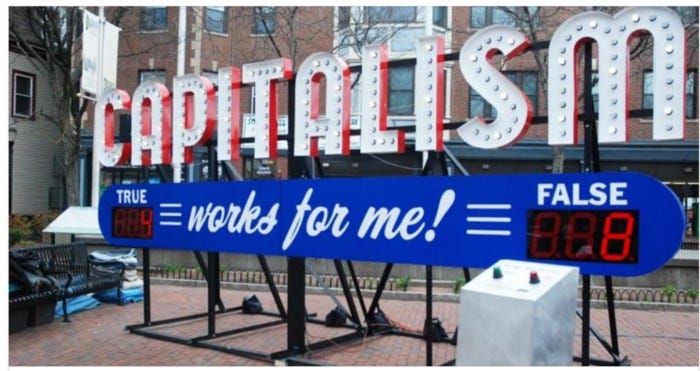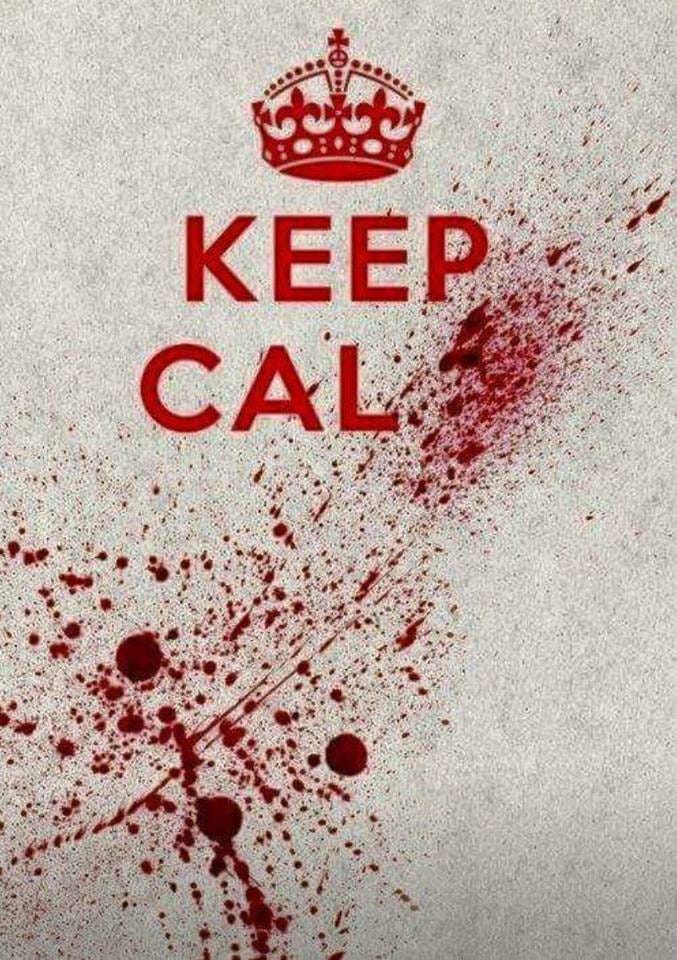Every Day You're Bombarded with Ads--Do You Think You're Actually Immune to Them?
It's not about believing or not believing an advertiser's claims. It's the subconscious feeling an ad leaves you with that makes you vulnerable.
If you ever want to see me in a sputtering rage, try selling me something. Being sold to in any form, in particular advertising, makes me insanely hostile, as in I refuse to have a television in my house for that specific reason. No one else seems to be especially bothered by it, which I always chalked up to my special form of weirdness—and to be sure, I am weird—but I truly believe that the entire concept of marketing is immoral and a net negative to society.
If it were merely adverts for a product, that’s one thing. But it isn’t. It’s a full frontal assault on your peace of mind, your concept of self, your benchmark for prosperity, and even your worth as a human being. Advertising shows you what you’re supposed to look like (thin, preferably white, and depending on the TV station or social media channel, no older than forty), where you’re supposed to live, what you’re supposed to drive, and it demonstrates what you’re supposed to want (the “good life” as defined by the advertiser). Its purpose is to manipulate consumers by appealing to their inherent narcissism.
These days, it’s not the product itself that advertisers are hawking, it’s what buying that product says about you and who you are. Purchasing an Avocado brand mattress, for example, means you’re a good, environmentally conscious person, right? The subliminal message is made apparent even by the name “Avocado.” Free associate that brand name for a second and tell me how it makes you feel. Avocadoes are clean, healthy, wholesome, simple. Believe me, the ad agency for Avocado brand mattresses knows that. Words invoke emotion in the same way that sound invokes emotion. A major chord is happy, a minor chord is sad, and when you buy an Avocado brand mattress (or so the advertising goes), you’re going to feel soooooo good about yourself.
The things you look at everyday inform your world view. We forget that, but it’s true.
With laser-like precision, advertisers have psychologically atomized us, ripped us apart, and studied our steaming entrails. They know what makes us tick. Worse, they operate with total impunity for one reason and one reason only. Not because of any nebulous consumer protection laws about truth in advertising, but because we foolishly believe we’re in complete control of our choices. “I’m immune to advertising,” we say to ourselves. But that’s exactly the kind of delusional thinking that allows advertisers to continue drilling holes into our craniums.
We think of advertising as mildly unpleasant background noise, like a dog barking. We don’t take it seriously because we don’t think it affects us. But you can’t even pump gas at a gas station without a video screen blaring at you from every dispenser. Billboards loom over our freeways, grabbing at our eyeballs. Turn on the radio, more ads. Go online, more ads, clever ones, ads that are tenderly crafted by computer algorithms that know you more intimately than a lover.
It’s no longer paranoid to say that a sinister “they” is listening to every word you utter, every search you do, every cookie you leave behind. Because they are.
There’s nowhere to hide. Advertising has become so tightly woven into the fabric of American life, we don’t even notice that ten minutes of network television programming now lead to ten minutes’ worth of commercials. That logging onto airport Wi-Fi requires that you sit, a frustrated and unwilling captive, while they force-feed you ads. We turn a deaf ear to the flight attendant who spends fifteen minutes on the public address system pitching credit cards while we’re 30,000 miles in the air and strapped to our seats.
And the more we tune out the corporate roar, the louder it gets.
More and more, we see advertising’s deadly effects. The obesity crisis that has arisen from an endless loops of ads pushing foods that are laden with sugar, fat, and salt—the very trifecta of evil. Pharmaceutical come-ons that elide over the dangerous side effects, many of them absolutely horrifying (how about a little “suicidal ideation?” Or maybe you’d prefer a stroke?), while showing you a version of the life you could have if you’d get off your fat ass and call a doctor.
Let’s talk about the influence advertising has had on our nation’s opioid crisis. The Sackler family didn’t just stop at glossy magazine spreads but went straight to the source: doctors and family-care providers, flat-out lying about their product’s addictive dangers and ruining the lives of millions of families.
How do you like your “growth model capitalism” now?
It will come as no surprise to you to learn that nine out of ten of the biggest pharmaceutical companies spend considerably more money on advertising than they do on research. That’s because American healthcare is a for-profit, money-making, corporate-driven juggernaut. Corporations have a legal mandate to turn a profit for their shareholders. How do you get that to jake up with the idea of providing good healthcare?
American is a nation of credit card debt: $680 billion dollars in revolving credit and over 1.7 trillion dollars in total debt. Only about half of individual card holders pay off their balance each month. Europe isn’t like that. Here in Italy, we don’t even have FICO scores. But part of the fact that Europeans aren’t in ruinous amounts of debt is because, by law, they aren’t hustled so aggressively.
Whet the appetites of people who are little more than panicked monkeys, and you’ll get exactly what we’ve got in the United States: ravenous consumers.
We see, we want, we buy.
U.S. companies would not invest $70 billion in something that doesn’t work. Of course advertising works, and it works on people of all IQs, educations, and socioeconomic backgrounds. Naked attempts at persuasion don’t affect our spending habits so much as slyly leaving an impression. They seed our memories with subconscious emotions that our reptile minds remember later on when we’re trying to decide between ten different kinds of shampoo. At their worst, advertising coopts the messages of activist culture in the same way Trump does when he puts Black people in MAGA hats right behind his podium when the camera’s rolling.
Someone who watches MSNBC, say, is going to be more receptive to ads showing inclusivity—people of color, size, LGBTQ. On MSNBC, it’s all pills, insurance, and Save the Children. Now, zoom on over to Fox. Totally different advertising profile. Their top sponsors? Applebees, Buick, MyPillow, Nutrisystem, Weight Watchers, CVS, TMobile. Aspirational living on Fox also looks a whole lot whiter. But make no mistake. MSNBC advertisers aren’t more virtuous; they merely employ a different means of separating you from your dollar.
So, what are we supposed to do about it?
First, we must acknowledge that believing or not believing an advertiser’s product claims is completely different than being left with an impression or affected on an emotional level by what we see. We’re all emotional. We’re all affected. We’re not immune to the blandishments of advertisers.
Second, we protect our space. That means using ad blockers online, avoiding network television, and turning off the radio. You have so many better alternatives—including making your own playlist to listen to on the way to work. Netflix and Hulu instead of CBS and NBC. Let the dinosaurs choke on their advertising dollars and rot.
Third, any advertisement in a public space that gives you no choice whether you see it or not is yours. That’s a Banksy sentiment, by the way, and I wholeheartedly agree. That advert is yours to take, rearrange, use, spindle, or mutilate. “Do whatever you like with it,” Banksy says. “Asking for permission is like asking if you can keep the rock somebody just threw at your head.
“You owe the companies nothing,” he continues. “Less than nothing. You especially don’t owe them any courtesy. They owe you. They have rearranged the world to put themselves in front of you. They never asked for your permission; don’t even start asking for theirs.”
So, the question is, do you wake up to what’s really going on around you, analyzing the ads you see for impressions, emotions, content? Or do you return to the soft comfortable chains of the passive consumer, drowsing hippos, all, oblivious to the fact that they’re being pelted by tourists.
I say wake up and fight.
Copyright © 2022 Stacey Eskelin
What are your thoughts about advertising? What specific ads set your teeth on edge? I want to hear all about them, so be sure to leave your comments below.





We've become so accustomed to being manipulated and lied to that we no longer know what the truth is- "Monkey see, Monkey buy." And yet, when we buy things we feel no better. No hole in ourself has been plugged. Our self-esteem is no better. We're bedding no more hot women than we were before.
It's because all of those things are superficial. They have nothing to do with WHO we are, merely how we think of ourselves and present ourselves to the outside world. That veneer can be seen through by anyone with half a brain, because most Americans have no sense of who they are...and even less self-awareness. They're so busy trying to be someone that they have no idea how to be themselves.
BTW, avocados are only useful as projectiles.🤣🤗
Ad blockers, VPN, streaming only (or purchased DVD/Bluray). I regularly run software that cleans out "privacy traces" that get left behind with "cookies." My browser (Firefox) blocks FB from tracking me across the web. I never use Google (massive tracking, advert tuning software going on there). Instead I use DuckDuckGo.com which guarantees no tracking. I don't use a smartphone; quite aside from the data charges that I don't need and would not use, they are (again) massive privacy leaks. Every time FB starts stove piping adverts into my feed I mark them all irrelevant and hide all from said advertiser.
You'll notice in the above list considerable over lap between "purely" advert related behaviors, and protecting my privacy. That is because the over lap exists in the world. Modern advertising (especially online) is built around pillaging your privacy.
By the bye, this short animation, "Happiness" (4:16) is very much in line with your post here:
https://www.youtube.com/watch?v=e9dZQelULDk